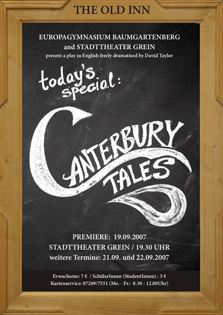 |
|
Plot
The Canterbury Tales is a collection of short tales,
originally in verse form, which were written by Geoffrey Chaucer around
1387. The narrative frame is provided by the setting of the Tabard Inn, a
tavern in Southwark, London, a group of pilgrims meet. These devout
travellers are on the way to the shrine of the martyr Saint Thomas Becket
in Canterbury. The devout travellers entertain one another with serious
and comical stories in order to avoid boredom.
David Taylor, from Vienna`s English Theatre, has selected four of theses
tales and adapted them for performance on stage. The topics dealt with are
of timeless significance including fundemental issues of human existance
such as love, treachery and greed.
The Pardoner`s Tale:
This narration exemplifies the idea that selfish desire and greed
inevitably leads to an after-life of suffering in hell. Three friends,
obsessed with thirst of revenge, venture out to find and destroy Death. On
their quest they have to face the consequences of a fateful encounter with
materialistic temptation...
The Merchant`s Tale
Anna, a beautiful young girl, is forced by her avaricious mother to marry
Martin, a wealthy, aged man. In her husband`s wonderful garden she falls
in love with Konrad, the amiable gardener. Perhaps divine trickery and
support will enable a happy ending to the cunning advances of love...
The Friar`s Tale
In this episode the devil is in a tough competition with a summoner. Their
aim is to find out who is best in their “gainful employment” – either the
devil with souls or the summoner with money. Although they seem to fail in
their first attempt to make profit out of a severe dispute among young
people, the undertaking is finally crowned with success involving an
unexpected “victim”!
The Wife of Bath`s Tale
This tale is set in the mythical world of King Arthur where a
love-stricken, young knight is supposed to clarify the tricky question as
to what women really want. On his odyssey he receives the correct answer
from an old woman who in turn puts him to a demanding test...
Now, honourable audience, it is up to you to decide which storyteller
succeeded best at teaching you a moral lesson!
|
|
|


